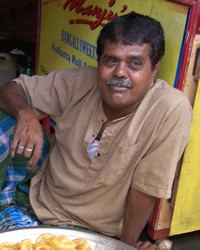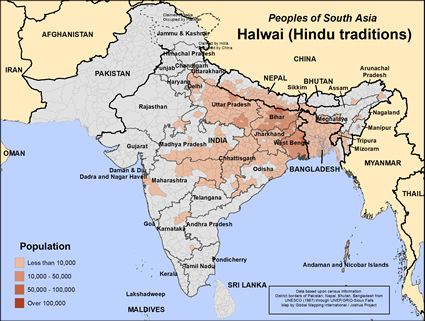Halwai (Hindu traditions) in India

Photo Source:
Rajesh Dangi - Wikipedia
Creative Commons
|

Map Source:
People Group data: Omid. Map geography: UNESCO / GMI. Map Design: Joshua Project.
|
| People Name: | Halwai (Hindu traditions) |
| Country: | India |
| 10/40 Window: | Yes |
| Population: | 1,462,000 |
| World Population: | 1,620,000 |
| Primary Language: | Hindi |
| Primary Religion: | Hinduism |
| Christian Adherents: | 0.00 % |
| Evangelicals: | 0.00 % |
| Scripture: | Complete Bible |
| Ministry Resources: | Yes |
| Jesus Film: | Yes |
| Audio Recordings: | Yes |
| People Cluster: | South Asia Hindu - other |
| Affinity Bloc: | South Asian Peoples |
| Progress Level: |
|
Introduction / History
For anyone with a sweet tooth, halwa is a familiar delight—a confection found across South Asia, the Middle East, West Asia, and North Africa. The dessert also lends its name to India's traditional community of confectioners, the Halwai. They are also known as the Kandu, and live primarily in western and northern India, with smaller communities in Nepal, Pakistan, and Bangladesh.
Historically, the Halwai held a special role in religious and social ceremonies, preparing sweets for weddings, funerals, and festivals. But in recent years, their craft has faced major challenges—rising ingredient costs, labor shortages, and insufficient technical training have made it harder to sustain traditional businesses. As a result, some Halwai have left their ancestral trade for work in other industries.
What Are Their Lives Like?
They are viewed with respect. Because of the importance sweets have in religion and socially, they have a special position in festivals, childbirths and marriages. Most Halwai people are comfortable financially, and some are wealthy, particularly in the cities and towns.
Sweet shops of Halwai grace towns and bazaars in north India. Some Halwai people are involved government, private work, engineering, medical, and agriculture. Their common language is Hindi.
They are mainly vegetarians, eating wheat, rice, fruit and vegetables. In Bihar, Halwai people eat chicken and mutton, but not beef. They enjoy milk and dairy produce, but not alcohol.
Halwai do not marry outside of their respective groups. They have one spouse. Divorce is permitted, and divorcees, and bereaved are permitted to remarry, and they practivce the tradition of dowry. They practice family planning and modern medicine.
They educate both boys and girls, which is unusual in India. Property is equally given to the sons. The oldest son becomes the leader in the home. Younger men often move away to begin businesses.
What Are Their Beliefs?
Most Halwai are Hindus, while a smaller number have converted to Sunni Islam, following the teachings of Islamic scholars. Some Muslim Halwai have even abandoned their caste-based surnames, adopting instead the names of their religious mentors—a symbolic step away from the caste system and toward a new spiritual identity.
What Are Their Needs?
Modernization is breaking down family units which have been the glue to society for many generations, and loneliness is increasingly a problem. They are expected to "achieve it all," but ironically, achieving it all can be empty.
Prayer Points
May the gospel satisfy the spiritual hunger of the Halwai people, that they may taste and see God's goodness.
Pray for Christ to reveal Himself to Halwai leaders.
Pray for the eyes of hearts to be open to Jesus Christ as Lord and King.